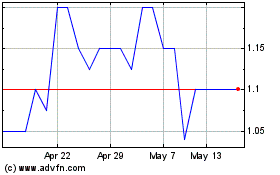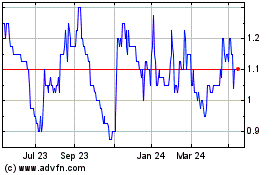TIDMGLR
RNS Number : 6642X
Galileo Resources PLC
14 August 2018
For immediate release
14 August 2018
Galileo Resources Plc
("Galileo" or "the Company")
Star Zinc Project - New Drilling Programme Commences
Galileo is pleased to announce the commencement of a 2nd
diamond-drilling programme (Programme) on its highly prospective
85%-owned Star Zinc Project ("Star Zinc") in Zambia.
Highlights
-- The Programme is scheduled for about 1000 metres (m) of
diamond core drilling to depths of up to 80m, with average depth
likely to be around 60 m
-- Drilling will initally target areas that are open ended
east-north-east and south-east of the known mineralised zone, which
previously modelled conceptual grade tonnage (CGT) estimate
(announced 4 June 2018) highlighted as having the exploration
potential to extend
-- Drilling will also target several nearby, "bulls-eye"
high-gravity geophysics anomalies. An independent review of Star
Zinc's historical geophysics data showed good correlation of
gravity anomalies with the mineralisation intersected in the 1st
drilling (or Initial) programme (announced 23 July 2018)
-- Drilling is expected to be completed during Otober and the
Company will provide regular udpates on core appearance, portable
XrF spectrometry indications and actual laboraory assays consistent
with that adopted in the Intitial programme
Colin Bird, Chief Executive Officer, said: "The Initial
programme confirmed the presence of very high grade williemite (up
to 38% Zn) adjacent to the collapsed ("pit") area in the
mineralised zone with extensions to the east and west of this area.
The Initial programme highlighted the presence of lower but still
relatively high zinc values in the karstic material. 3D-modelling
defined the presence and orientation of the two types of
mineralisation We believe that this Programme should extend the
known ore zone to the east and potentially identify near-surface
mineralisation in areas highlighted by the geophysics review.
The overall assessment showed further, the presence of
heightened lead values in the deposit. This is recognised,
academically, as a marker for the potential of a nearby feeder
source for mineralisation. The Company, depending on results, may
test this theory for the presence of a deeper feeder source during
this Programme.
Star Zinc has the potential for a stand-alone project as well as
a supplier of run-of-mine ore for the Kabwe project.
This announcement contains inside information for the purposes
of Article 7 of Regulation 596/2014.
Technical Sign-Off
Andrew Sarosi, Director of Galileo, who holds a B.Sc. Metallurgy
and M.Sc. Engineering, University of Witwatersrand and is a member
of the Institute of Materials, Minerals and Mining, is a "qualified
person" as defined under the AIM Rules for Companies and a
competent person under the reporting standards. The technical parts
of this announcement have been prepared under Andrew's supervision
and he has approved the release of this announcement.
This announcement contains inside information for the purposes
of Article 7 of Regulation (EU) 596/2014
You can also follow Galileo on Twitter: @GalileoResource
For further information, please contact: Galileo Resources
PLC
Colin Bird, Chairman Tel +44 (0) 20 7581 4477
Andrew Sarosi, Executive Director Tel +44 (0) 1752 221937
Beaumont Cornish Limited - Nomad & Joint Broker Tel +44 (0) 20 7628 3396
Roland Cornish/James Biddle
-------------------------
Novum Securities Limited - Joint Broker
Colin Rowbury /Jon Belliss +44 (0) 20 7399 9400
-------------------------
The Star Zinc Project
The Star Zinc project is a historical small-scale open pit mine
from where, reportedly, low tonnage, but high grade willemite (a
zinc silicate mineral) was extracted intermittently in the 1950s to
1990s.
The Star Zinc project is located approximately 18km NNW of
Lusaka (see Figure 3.1 below), and is accessible via the tarred
"Great North Road" and a good all weather graded road, with the
journey time from central Lusaka of approximately 30 minutes
(traffic allowing).
There is adequate power, water, rail & telecommunications,
with the International Airport at Lusaka, less than 45 minutes
away.
The Mines and Minerals Development Act No. 7 of 2008, which
grants a Large Scale Prospecting Licence for a maximum of 7 years,
governs the mineral tenement. Recent changes to the Act now
provides for an initial 4 years with a further two 3-year
extensions totalling 10 years, with a mandatory 50% reduction of
licence area at the completion of the 1st grant and 2nd grant
periods respectively. The first renewal period initially expired 13
August 2016 but was extended to 13 August 2018. The Company has
submitted an application for the next renewal period.
The Star Zinc Willemite project was mapped in the 1960s by
several geologists of the Northern Rhodesia (now Zambia) Geological
Survey.
At Star Zinc, two main fracture trends are present, one E - W,
and another N - S. Both sets of fractures are nearly vertical and
are irregularly mineralised. Willemite generally replaces the host
rock marbles in the form of massive ore bodies, but it occurs also
in veins
In addition, karstic (pertaining to landscape underlain by
limestone which has been eroded by dissolution, producing ridges,
fissures, sinkholes and other characteristic landforms)
mineralisation and red soils (terra rossa) are locally heavily
mineralised with detrital willemite and supergene zinc minerals.
Zinc values measured in soils at Star Zinc reach up to 15,600 ppm
and are accompanied by the pathfinder elements Ag (silver), Pb
(lead), Ba (barium), Sb (antimony) and Cd (cadmium). The karst
infill has a zinc (Zn) content up to 45wt.% Zn, up to 35wt.% Fe and
up to 5g/t Ag.
The mineralogical assemblage of Zn nonsulphides includes a whole
number of minerals, but the main economic phases present are
Zn-silicates (willemite, hemimorphite, Zn-bearing clays), Zn- Pb
carbonates (smithsonite, cerussite), hydrated Zn- Pb carbonates
(hydrozincite, hydrocerussite) and Zn- Mn- Fe- oxides (zincite,
franklinite, gahnite).
Limited independent metallurgical testwork by others has clearly
shown that the willemite present at Star Zinc is amenable to acid
leaching with positive results for two samples tested. Zinc
leaching efficiencies obtained ranged from 89% and 92%. The
testwork indicated polymerisation of dissolved silica in the
leachate.
An independent competent person's report commissioned by BMR
concluded. In summary, the Star Zinc project has good potential to
become a viable project.
Note: the information about Star Zinc is sourced primarily from
Competent Person's Report for the Star Zinc Project, Zambia;
Wardell Armstrong, January 2016
Glossary
Detrital loose fragments or grains that have been worn away from rock
Calcite mineral of calcium carbonate
Dolomite mineral composed of calcium magnesium carbonate
Dolomitic pertaining to dolomite
Floats pieces of rock that have been removed and transported
from their original outcrop
Hematite reddish-black mineral consisting of ferric oxide. It is
an important ore of iron.
ICP-OES/MS inductively coupled plasma - optical emission spectrometry/mass spectrometry
Karst landscape underlain by limestone (calcium carbonate),
which has been eroded by dissolution, producing ridges, fissures
and so on
Karstic pertaining to karst
Leaching chemical process of solubilising metals in rock into solution
ppm parts per million
XRF Spectrometer analytical instrument for determining chemical
composition using x-ray fluorescence spectrometry
Supergene pertaining to processes or enrichment that occurs
relatively near surface
Willemite zinc silicate ore mineral
This information is provided by RNS, the news service of the
London Stock Exchange. RNS is approved by the Financial Conduct
Authority to act as a Primary Information Provider in the United
Kingdom. Terms and conditions relating to the use and distribution
of this information may apply. For further information, please
contact rns@lseg.com or visit www.rns.com.
END
DRLFKNDKABKDOFD
(END) Dow Jones Newswires
August 14, 2018 02:00 ET (06:00 GMT)
Galileo Resources (LSE:GLR)
Historical Stock Chart
From Oct 2024 to Nov 2024

Galileo Resources (LSE:GLR)
Historical Stock Chart
From Nov 2023 to Nov 2024
